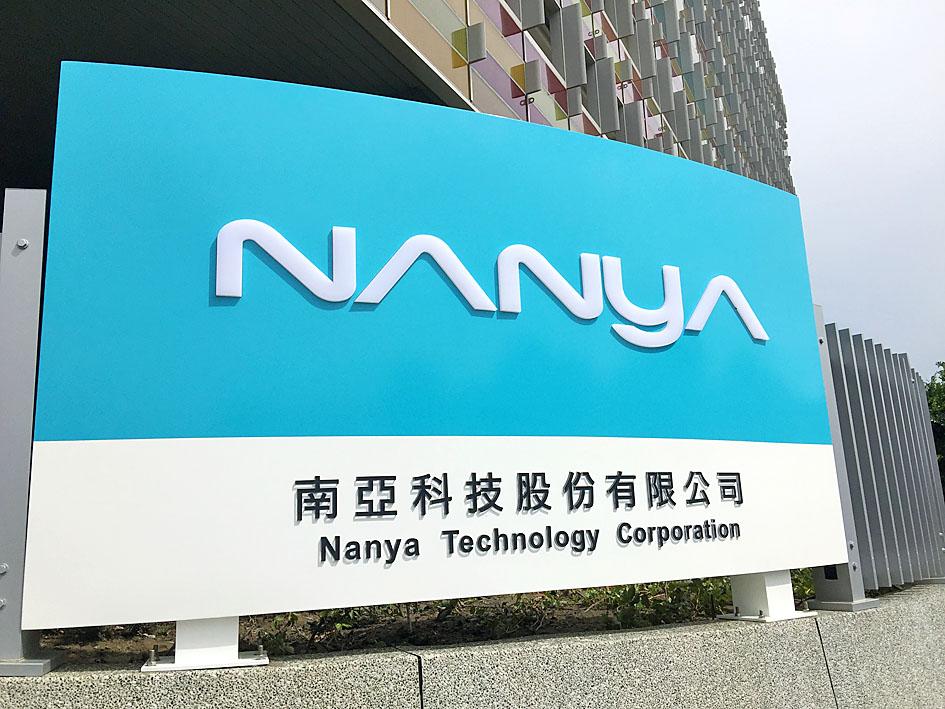Nanya Technology Corp (南亞科技) yesterday said that the memorychip industry is heading into a moderate correction period through early next year after a booming third quarter, during which its net profits almost quadrupled from a year earlier.
The nation’s biggest DRAM chipmaker expects the latest downturn would be short-term on the back of a slim inventory of chip supplies and relatively robust demand from servers, commercial computers and high-end consumer electronics such as smart speakers and networking devices.
However, an uneven supply of key components could cut into their growth, the chipmaker said.

Photo: Hung Yu-fang, Taipei Times
“This is not the winter for DRAM [companies],” Nanya Technology president Lee Pei-ing (李培瑛) told a virtual media briefing.
“The industry is entering a correction period in the fourth quarter and will be in place in the first quarter next year, but it will not last long and will not be as dramatic as it was in 2017, or 2018,” Lee said.
For Nanya Technology, revenue this quarter might slowly return to the level between the third quarter and second quarter, Lee said.
That was a downgrade from an estimate of flat or mild growth three months ago, he said.
The chipmaker expects prices to drop sequentially this quarter, while shipments remain little changed.
Nanya Technology yesterday scaled back its capital expenditure budget for this year to NT$12 billion (US$427.87 million) from an earlier estimate of NT$15.6 billion, due to a delay in equipment payments.
During the previous downcycle, most memorychip makers managed to make a small profit during the chilly seasons, which was different from the industry slump five or 10 years ago that pushed almost all memorychip suppliers into a crisis, Lee said.
It is a different situation this time, as most DRAM suppliers have seen their inventory fall to an extremely low level, or have leveled off all inventory, Nanya Technology said.
By application, Chromebooks showed some weakness as a rush by consumers approaches its end, it said.
Demand for automotive and industrial devices is also declining amid a scarcity of chips, mostly made with 8-inch wafers including power management ICs, driver ICs and audio ICs, Nanya Technology said.
A surprise halt in electronics production at factories in Malaysia, Vietnam and other Southeast Asian countries due to COVID-19 restrictions further curtailed memorychip demand, it said.
Nanya Technology saw net profit soar last quarter to NT$7.53 billion, compared with NT$1.61 billion in the third quarter last year. That represented quarterly growth of 22 percent from NT$6.16 billion.
Earnings per share jumped to NT$2.44 last quarter, from NT$0.53 a year earlier and NT$2 in the prior quarter.
A 20 percent price hike helped boost gross margin to 49.2 percent last quarter from 42.3 percent in the second quarter. Gross margin stood at 25.9 percent one year earlier.
Commenting on the US’ latest efforts to boost chip supply chain transparency, Nanya Technology said it would not release customers’ confidential information.

In Italy’s storied gold-making hubs, jewelers are reworking their designs to trim gold content as they race to blunt the effect of record prices and appeal to shoppers watching their budgets. Gold prices hit a record high on Thursday, surging near US$5,600 an ounce, more than double a year ago as geopolitical concerns and jitters over trade pushed investors toward the safe-haven asset. The rally is putting undue pressure on small artisans as they face mounting demands from customers, including international brands, to produce cheaper items, from signature pieces to wedding rings, according to interviews with four independent jewelers in Italy’s main

Japanese Prime Minister Sanae Takaichi has talked up the benefits of a weaker yen in a campaign speech, adopting a tone at odds with her finance ministry, which has refused to rule out any options to counter excessive foreign exchange volatility. Takaichi later softened her stance, saying she did not have a preference for the yen’s direction. “People say the weak yen is bad right now, but for export industries, it’s a major opportunity,” Takaichi said on Saturday at a rally for Liberal Democratic Party candidate Daishiro Yamagiwa in Kanagawa Prefecture ahead of a snap election on Sunday. “Whether it’s selling food or

CONCERNS: Tech companies investing in AI businesses that purchase their products have raised questions among investors that they are artificially propping up demand Nvidia Corp chief executive officer Jensen Huang (黃仁勳) on Saturday said that the company would be participating in OpenAI’s latest funding round, describing it as potentially “the largest investment we’ve ever made.” “We will invest a great deal of money,” Huang told reporters while visiting Taipei. “I believe in OpenAI. The work that they do is incredible. They’re one of the most consequential companies of our time.” Huang did not say exactly how much Nvidia might contribute, but described the investment as “huge.” “Let Sam announce how much he’s going to raise — it’s for him to decide,” Huang said, referring to OpenAI

The global server market is expected to grow 12.8 percent annually this year, with artificial intelligence (AI) servers projected to account for 16.5 percent, driven by continued investment in AI infrastructure by major cloud service providers (CSPs), market researcher TrendForce Corp (集邦科技) said yesterday. Global AI server shipments this year are expected to increase 28 percent year-on-year to more than 2.7 million units, driven by sustained demand from CSPs and government sovereign cloud projects, TrendForce analyst Frank Kung (龔明德) told the Taipei Times. Demand for GPU-based AI servers, including Nvidia Corp’s GB and Vera Rubin rack systems, is expected to remain high,